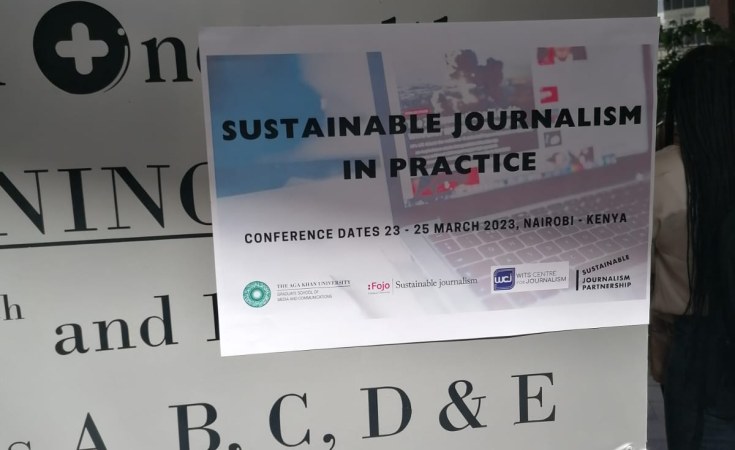Harare — "We are facing an epidemic of epidemics. If we are looking at the data on this you'll see that over the last decades we have an increasing number of outbreaks. We have zoonotic diseases or vector borne diseases that are affecting humans, increasing number of outbreaks of disease that affect livestock and poultry on the eve of an increasing number of outbreaks affecting the wildlife."
These are the words of Serge Morand, Health Ecologist at CNRS and member of the One Health High Level Expert Panel (OHHLEP) of the One Health Quadripartite who was speaking during a webinar hosted by the Earth Journalism Network.
Held on the heels of UN Climate Change Conference (COP27) and the 7th World One Health Congress, and days ahead of the UN Biodiversity Conference (COP15), this webinar draws journalists' attention to the linkages between human health, the climate crisis and biodiversity loss, and how journalists, can report on the issues at the intersections of these themes.
We heard from expert speakers on how the climate emergency and biodiversity loss can lead to the emergence of infectious diseases and other health issues, and the policy solutions and global actions that are being undertaken to address them.
According to Morand, the drivers of the epidemics are complex but climate change is one of them.
"The total number of cattle on Earth is more than 1,600,000,000 while the number of chickens is close to 40 billion, number of pigs, close to 1.5 billion, a little decrease because of the pandemics that is also affecting the the pig collection," he said.
"There was a recent study where they looked at the entire world and where the risk of infectious disease outbreaks are in the world. And, you know, there is obviously we've heard of these hotspots in the Asian region. And you can see some hotspots in Europe as well. So areas where the population is very concentrated," says De Alwis Adamberage Ruklanthi, Deputy Director of the Center for Outbreak Preparedness (COP) and Assistant Professor at the Emerging Infectious Diseases (EID) Programme at Duke-NUS Medical School.
Climate change leads to a lot of hazards, she said, adding that with global warming, there's a lot of precipitation, floods, some regions have droughts and storms. So there's erratic weather patterns."
Warmer temperatures enhance dengue virus replication within the mosquitoes' bodies, so that they are able to infect new hosts more quickly. A warmer climate also affects the range of Aedes mosquitoes, allowing them to overwinter in more regions, and expanding the range to higher elevations and latitudes.
"From the outbreak, preparedness side of things, we are looking at ways to sort adaptation methods. So to make sure that we are prepared when an outbreak does happen, and one of the major ones that we're doing is really enhancing pathogen surveillance systems, making sure that when that outbreak happens, whether it's from an animal jumped to a human ... whether it's direct respiratory, we actually capture it," said Ruklanthi.
She also mentioned how new research is needed at the intersection of climate change and infectious diseases. "That's a direction that we as a world need new funding that goes into it. Again, these are very complex studies. However, these need to be done to really assess the true impact of climate change on infectious disease outbreaks".
Thus, climate journalism plays a vital role in shaping the public discourse on the climate crisis in a responsible manner, enabling the people to act and shape the green and sustainable future that they want for themselves, their children, and the future of life on the planet.
Siew Lyn Wong, co-founder and editor at Macaranga, an independent media outlet specialising in environment and sustainability touched on how as journalist we should connect the dots and report responsibly.
"So WHO has this wonderful guide, which has sections, how to cover health emergencies, and how to protect yourself, your own health as a journalist. Now, I think one of the one takeaway from this is, think of the impact your reporting will have. You read the room, understand what is going on. Is the world in panic? What's your job as a journalist, if the world is in panic, how do you report responsibly, and these are some of the points that you want to be as clear and understandable and accurate as possible," she said.
"You want to respect privacy, you do not want to publicise, and you want to avoid absolutes. Science is wonderful, but it can be very uncertain. And as we saw in COVID, it can keep changing, right? So what do you do, for example, if you have two research papers from very good sources, but they contradict each other.
Lyn Wong also touched on how our mental health is priceless. "No story is worth sacrificing your health? Not at all," she said.
The Centers for Disease Control and Prevention (CDC) already concluded that the climate emergency leads to death and illness from increasingly frequent extreme weather events. Your life is more likely to be disrupted or claimed by respiratory and cardiovascular diseases, and infectious diseases, heatwaves and storms, the slowdown of food distribution and mental illness.
From clean air, safe drinking water, enough food and secure shelter, the climate crisis affects the social and environmental determinants of health, and between 2030 and 2050, is expected to lead to the deaths of a quarter of a million people per year, from malnutrition, malaria, diarrhoea and heat stress, according to the WHO.
In Africa, climate-related health emergencies are on the rise, accounting for more than half of public health events recorded in the region over the past two decades, an analysis by WHO shows. It found that of the public health events recorded in the African region between 2001 and 2021, 56% were climate-related and that climate-linked emergencies are increasing, with 25% more climate-related events recorded between 2011 and 2021 compared with the previous decade.


